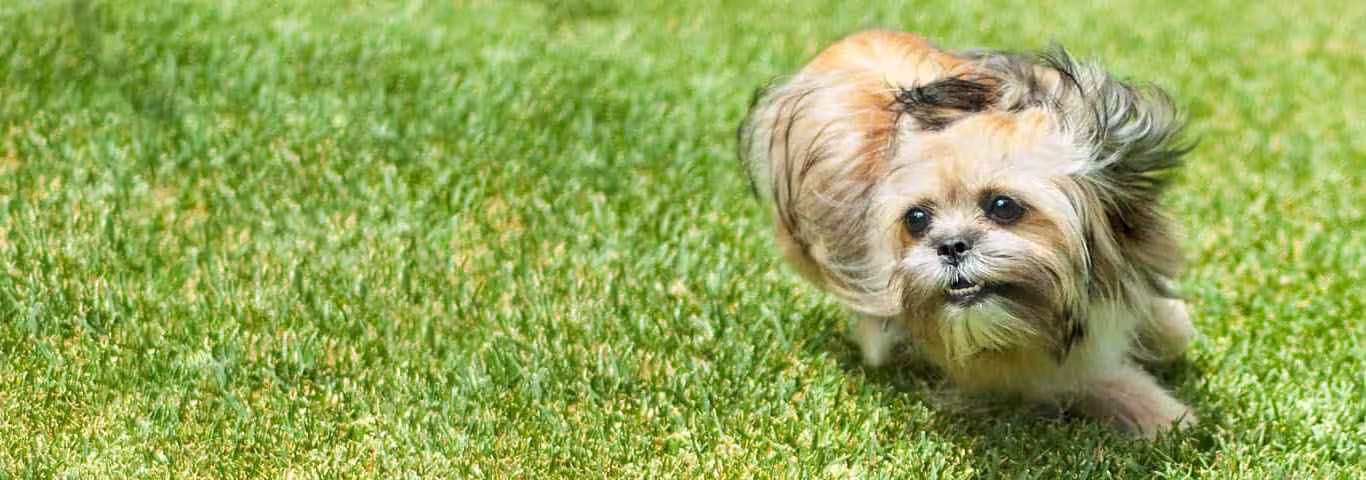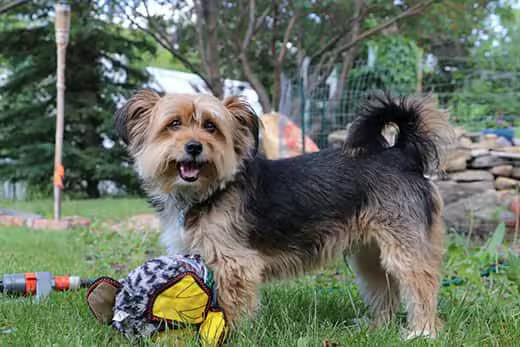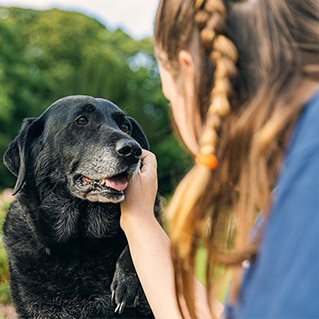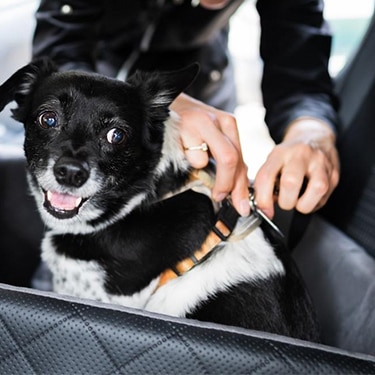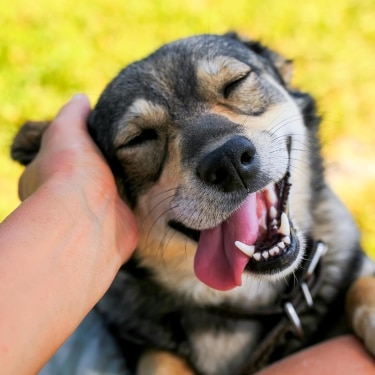One of the newer additions to the "designer dog" trend, the shorkie dog breed is a cross between a Yorkshire terrier and a shih tzu. No breed standard currently exists for shorkies, which are technically mixed-breed pups, so it can be hard to predict which parent breed they'll take after in terms of appearance or temperament. Ideally, a full-grown shorkie dog will achieve a happy balance of breed characteristics.
Depending on whether they get their size from the diminutive Yorkie or the more sturdy shih tzu, shorkies can weigh anywhere from five to 15 pounds and may stand between six and 14 inches at the withers. The head may be more on the round side with wide-set, rounded eyes, and ears are typically longer and floppier than those of the Yorkie. The shorkie might inherit a shorter snout and a slight underbite from the Shih Tzu parent.
Coloring tends to be any combination of what you'd see in either parent breed, including red, blue, black, white, brown and fawn. The hair tends to grow long and be straight, silky and low-shedding, with mild hypoallergenic qualities that can make them a good match for mild allergy sufferers, says PetGuide. The fur can be worn long and slightly shaggy, or be kept in a puppy clip.
Spunky, playful and energetic, one thing that's commonly said about shorkies is that they don't know they're small. They're also loving, affectionate and fiercely loyal, and love to curl up in a lap and cuddle. Shorkies tend to get along with the whole family, but they form the tightest bonds with their primary caretaker and will often stick to that person like glue, says Dogtime.
Keep in mind that shorkies are half terrier, which means they can be a little high-strung, but also highly intelligent. Their terrier tendencies also include a high prey drive that will have them chasing small animals and may cause them to dig. Both of their parent breeds tend to be willful, which can make training, including house training, a challenge; it's best to start training as early as possible. Shorkies respond best to positive reinforcement and consistency.
Shorkies have high attention needs, and can be clingy, particularly with their favorite family member. They're prone to extreme separation anxiety and destructive behavior when left alone. Crating shorkies might only lead to injuries as they scratch constantly in an attempt to escape, although they can be successfully crate trained at a young enough age, says PetGuide.
You'll have the best results acclimating your shorkie to being left alone if you can start working with them as young puppies. If adopting an older shorkie, they tend to do best in homes where they can be the center of attention and have someone home with them most of the time.
The shorkie's small size makes them excellent for apartments and small spaces, although they tend to bark at the slightest disturbance. While this is a great quality if you're looking for a small watchdog, it might not make you popular with the neighbors, especially if you have thin walls. Shorkies make great companions for singles, couples and active seniors, although they can also fit in well with larger families. They can do well with older children, but due to their size they should be watched closely during playtime with younger children to prevent them from getting injured. They might also get nervous around children they don't know well. They should be socialized to other pets at an early age to prevent them from becoming territorial and protective of their space and people. Otherwise, they may show aggression toward other animals, including dogs much larger than themselves.
Shorkies need about 30 minutes of exercise a day, which can be satisfied with a combination of short walks and vigorous playtime. These pups love to play interactive games like fetch, and they also adore toys. But once their energy is spent, they'll be content to curl up in your lap and simply keep you company. These dogs also love to play outdoors when they get a chance, but they shouldn't be left outside unsupervised, even in a securely fenced yard. The combination of their fearlessness and obliviousness to their small size is too much of a recipe for trouble to leave them on their own.
Between these dogs' stubborn streak and their tiny bladders, house training can be an issue, and accidents are prone to happen. Your shorkie might do best with having pee pads in various rooms around the house for emergencies.
While shorkies tend to be hardy, they're at risk for the same breed dispositions as both of their parent breeds, including hypoglycemia, glaucoma and congenital liver disease. Shorkie dogs who inherit the shih tzu's short nose may also experience brachycephalic airway syndrome and other respiratory problems, which will place them at higher risk for heat-related illnesses. This might also make them prone to snoring.
Like most small breeds, shorkies are also predisposed to dental problems, and will need regular dental checkups and tooth cleanings. A good daily oral care routine that includes tooth brushing and dental chews will help their teeth and gums stay healthy longer, which will have a positive impact on their overall health. Feeding dry kibble can also help keep teeth strong. Look for a high-quality dog food for small breeds with high energy levels. To prevent overfeeding, it's best to stick to a schedule of two small meals a day rather than letting them graze from their bowl throughout the day.
Shorkies are high maintenance when it comes to grooming, with long, silky coats that require daily brushing. They may also need to visit a groomer every six weeks or so for a trim. They may have overactive tear glands that cause staining around the eyes. If that's the case, frequent wiping throughout the day can help prevent buildup and reduce the appearance of tear stains.
Shorkies come from two breeds that aren't well suited to extreme temperatures. Your shorkie will be most comfortable wearing sweaters and coats to keep warm in the winter. During the hot months, extra care should be taken to prevent them from overheating, especially if your shorkie pup has a shortened snout or experiences breathing problems.
The shorkie dog breed is a recent phenomenon. While it's highly probable that unintentional Yorkie and Shih Tzu pairings occurred naturally throughout history, the two breeds weren't intentionally crossed in the U.S. until the 2000s, with the goal of breeding an adorable companion with the spunk and tiny size of the Yorkie and the sturdiness and loyalty of the Shih Tzu. As a crossbreed, shorkies aren't recognized by the American Kennel Club. But the American Canine Hybrid Club recognizes this breed as the Shorkie Tzu, and they can also be registered with the International Designer Canine Registry.
Adopt a pet. Change a life.
Are you prepared to adopt a pet? Use these tools to make sure you are ready for the commitment.
Adopt a pet. Change a life.
Are you prepared to adopt a pet? Use these tools to make sure you are ready for the commitment.












